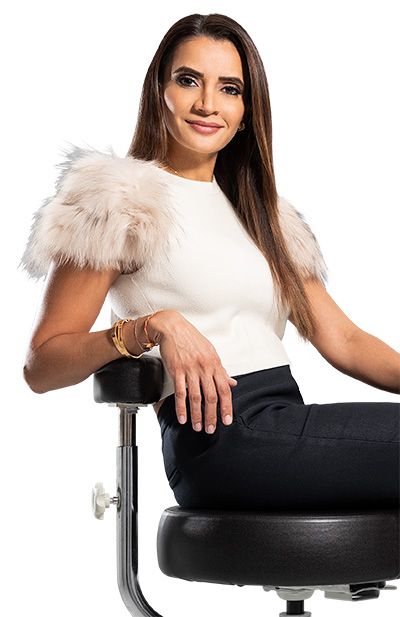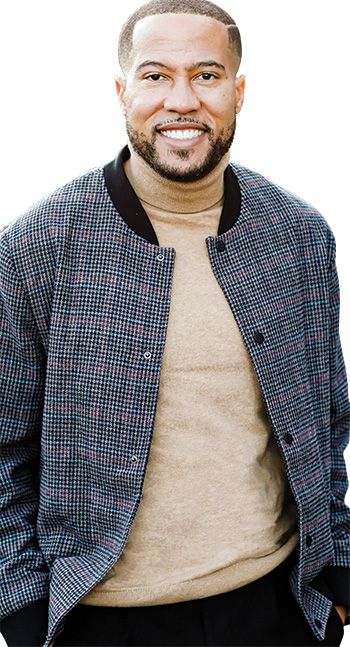Dimple Desai
SHE PERSISTED
Dr. Dimple Desai’s lifelong determination has served her well, from her teen years through her time at USC Dental and now as a gifted practitioner, philanthropist and continuing-ed enthusiast.

PHOTOGRAPHY BY IAN SPANIER
Age: 40
City: Newport Beach, California
Name of Practice: Luminous Smiles
Education: DDS, University of Southern California
Why She Was Nominated: Originally a hygienist, Dr. Desai was driven to earn her DDS as well. Last year she spent her quarantine time wisely, completing clinical course work via Zoom, waxing teeth models into ideal contours on her dining-room table—all while homeschooling her kids.
Sage Advice: “Never stop learning. I’ve taken over 1,000 hours of continuing-education courses, and I’ve implemented every aspect of my education into my daily practice.” Something People Don’t Know: Dr. Desai was a child model until around age 4. “My mother would take me to photo shoots.”
DR. DIMPLE DESAI has always been motivated. Intrigued by the profession in her teens, she helped out at her family dentist’s office when she was 15, and within three years was a student at the University of Southern California, stopping by the dental school “every week. One day when I walked in, Mark Mitchell, an admissions director, said, ‘You again? You’re the most persistent person I’ve ever met.’ ”
Mitchell pointed her in the direction of USC’s hygiene program, which ultimately led her to dental school there—and a steady gig. “I worked six years in hygiene, even through dental school,” she says. “I kept up my skills and knew how to treat patients chairside.” Today, she’s back on campus as a clinical adjunct professor.
Years ago, as an associate in private practices, Dr. Desai continued to pursue her education. “I was learning all the time, but the practices where I worked were not on the same page,” she says. After consulting with her husband, Sagar, in 2016 she took the leap from part-time work to full-time independence as her own boss at Luminous Smiles in Newport Beach, California.
A key mentor throughout: the legendary Dr. John Kois. “He’s made a huge impact on me,” Dr. Desai says. “He’s changed the way I perform and think.” After attending his course, “I changed my whole practice the following Monday morning.”
Her informed decisions ended up paying significant dividends amid the pandemic—her choice of relatively spacious 125-square-foot operatories, for example, allow room for a photography cart, scanner, a passel of other equipment . . . and an air filter to combat pesky particulate matter. The months she spent in continuing education during quarantine months were a wise investment as well.
Philanthropy remains a passion. “I had an epiphany about the perfect place to give back: India,” she says. “I’ve been there three times, and the poverty is unreal.” In 2019, she reached out to dental vendors to procure supplies, created oral-hygiene kits and began planning. She connected with orphanages in India’s immense Gujarat state, and for 20 days in December 2019, she and her team of volunteers—which included her parents—provided care there.
Her husband and two children were with them as well, and it warmed Dr. Desai’s heart to see her kids realize “that we live in this bubble [in the U.S.],” she says. “One night when we came home, my son said, ‘Mom, we’re so lucky.’ That’s all I needed to hear. I can’t wait to go back.”
She’s now working toward accreditation from the American Academy of Cosmetic Dentistry—the latest goal in a peripatetic career whose twists and turns she’s sanguine about. “You reach a point where it doesn’t matter anymore if you’re male or female, or how you were raised and what was expected of you,” says Dr. Desai, the first (and so far the only) female in her family to earn an undergraduate degree. “Because this is where you are now.” —Kristie Ceruti
It doesn’t matter if you’re male or female, or how you were raised. Because this is where you are now.”
Andrew Lyons
SAVVY OPERATOR
Life lessons, and a new professional purpose, in the wake of a year spent turning obstacles into opportunities.
When someone wants to come to you for the right reasons, they will travel to see you, take time off. We’ve become that, and it’s beautiful.”

PHOTOGRAPHY BY ARIEL PERRY
Age: 37
City: Charlotte, North Carolina
Name of Practice: Smile Savvy Cosmetic Dentistry Education: Bachelor’s in biology, North Carolina Central University; DDS, Meharry Medical College
Why He Was Nominated: Dr. Lyons’s interest and expertise in dental-practice design has advanced to the point where he’s now being tapped by his peers to give talks at professional events on how best to optimize the look and flow of a dental office for maximum patient, doctor and team comfort. He and his wife, Dr. Joya Lyons, founded The Lyons Share, a charitable extension of their practices that partners with various nonprofit groups to give away four “smile makeovers” every year.
Exciting New Trend: Even before the pandemic made telemedicine far more widely used, Dr. Lyons had already signed on to be able to offer “Smile Virtual Consultations”—just one more way he has implemented the latest technology in his practice for his patients’ benefit.
IN FEBRUARY 2014, Dr. Andrew D. Lyons II and his wife, Dr. Joya Lyons, opened their first practice together in Charlotte, North Carolina, just a few years after earning their dental degrees from Meharry Medical College in Nashville. At first the pair offered the standard menu of care—high-quality, worthwhile work, to be sure, but something was missing.
“When you first get out of school, you’re flooded with information, and you feel like you need to be all things to all people,” Dr. Lyons says. “Every time you refer a patient, you feel like you’re doing them a disservice.”
Mildly disconcerted, the two doctors formu-lated a question that would change their entire professional purpose: Why not give health to people at your highest level? That meant focusing on what they loved best—and in 2020, taking a cue from the increasingly popular niche-service model seen in any number of disciplines, they began a dramatic shift from their established brand, eschewing the PPO model in favor of fee-for- service work at Smile Savvy Cosmetic Dentistry.
“We found out that when someone wants to come to you for the right reasons, they will travel to see you, take time off, figure out the finances,” Dr. Lyons says. “We’ve become that, and it’s beautiful.”
Among the lessons he gleaned: The experts aren’t always right. “We had coaches and worked with consultant groups, three different accoun-tants and financial advisers,” he says. “When
I told them my wife and I wanted to be a fee-for-service cosmetic dental office, they advised against it. I wish I would’ve listened to the voice inside three or four years [earlier].”
Then came 2020.
“When Covid happened, some of our old team decided to go on to different careers,” Dr. Lyons says. “It was almost a blessing in disguise, because we were able to recruit. People gravitated toward us from offices that were already like what we wanted to be.” They recruited widely among talented people with a fee-for-service background, and astonishing results arrived within months.
“We tripled our bottom line. My wife and I were floored,” Dr. Lyons says. “There’s something about people being in purpose, when they see and support the vision.”
Continued growth is on tap for the rest of 2021 as pandemic restrictions gradually ease. Dr. Lyons and his wife are ready. He cites advice from his brother-in-law J. White, an accomplished musi-cian. “He said he was gifted with the curse to love playing the saxophone, even when the gigs don’t fill up. Now he’s got Billboard [chart hits], royalties from his songs playing on every platform. He told me, ‘It’s not that you don’t believe—you’re allowing yourself to believe others who don’t even know what your gift is. You’ve got to hang in there and trust that it’s going to open doors.’ ” —Kristie Ceruti
We tripled our bottom line. My wife and I were floored. There’s something about people being in purpose, when they see and support the vision.
Sarah Khan
Rare Form
Forward-thinking preparedness kept Dr. Sarah Khan poised and confident despite the virus. We circled back with the two-time Incisal Edge honoree to get her take on the year that was.
More and more general dentists are placing implants. If they aren’t placing implants, they are referring more implants to specialists.

PHOTOGRAPHY BY MICHAEL DOUCETT
Age: 38
City: Lynnwood, Washington
Name of Practice: Dentistry of Lynnwood
Education: DMD, University of Pennsylvania School of Dental Medicine
Why She Was Nominated: A member of the 40 Under 40 class of 2017, Dr. Khan has added substantially to her résumé in the three years since—so much so that she was honored again by this magazine in the Clinical Expert category of our 2021 Lucy Hobbs Awards. She initially came to our attention after purchasing and quickly turning around two failing practices in 2014 in one of America’s most crowded and competitive markets. Through a combination of technology-driven clinical excellence and business savvy, she more than doubled her patient numbers in the first year alone. She has remained on our radar ever since, and we’re not the only ones. Dr. Khan was named a “top dentist” by Seattle Metropolitan . . . twice. And her continuing-education cred is too long and exhaustive to attempt listing here.
Exciting New Trend: Dentists who weren’t proactive about minimizing aerosols prior to the pandemic are now confronting the problem head-on. Expectedly ahead of the curve, Dr. Khan has had a Surgically Clean Air system installed in her office since 2018, and she knows of many colleagues who have followed suit.
IT’S COVETED AMONG Hollywood’s elite. The EGOT—an acronym for Emmy, Grammy, Oscar and Tony—refers to a rare career sweep of all the major entertainment awards. We don’t know of any direct equivalent in the world of dental medicine, but Dr. Sarah Khan has come close to something like it within the pages of this magazine. In addition to her awards (see “Why She Was Nominated,” above), she has now graced two covers (together with her fellow 40 Under 40 honorees in Fall 2017 and solo in our Winter 2021 issue).
So naturally, we turned to her for observations and advice for our inaugural issue dedicated to innovation.
“As dentists, we are innovators. Last year was no different,” she says. “Every dentist felt their practices slow down due to the pandemic. However, this stress made us realize the importance of proper preparation for a pandemic, and also the ability to assist our patients using technology we already have.” She cites teledentistry as the prime example: “Not many dentists took it seriously until 2020.” She called the year a “catalyst” in solidifying denti stry’s bonds with cutting-edge communications technologies that help connect doctors and patients, regardless of the circumstances keeping them apart.
While virtually everyone in health care put safety first in 2020, Dr. Khan was careful also to prioritize the business side of her practice. “Urgency in dentistry is correlated with profitability. We saw fewer patients, but saw that the urgency created avenues for more profitability in the same time frame versus pre-pandemic scheduling.” That was easier since Dr. Khan didn’t have to change much to keep safely chugging along through Covid-19. Her team was already using enhanced PPE and air-quality tech, so the addition of face shields and a few other tweaks to their protocols were all that was needed.
Forgetting the pandemic for a moment, if that’s possible, Dr. Khan points to implantology as undergoing significant growth she expects will continue. “More and more general dentists are placing implants. If they aren’t placing implants, they are referring more implants to specialists.” Since a substantial portion of her practice is dedicated to patients seeking implants and implant- retained dentures, she knows firsthand what’s driving it. In particular, she points to “the predictability of implants utilizing cone beam and also guided surgery technology. Already, surgical stents can be fabricated in-office using scanners and 3D mills. More offices will have in-house labs that can fabricate the abutment and crown after an implant has been placed.”
Dr. Khan was recently named CEO of a new mobile app aiming to transform access to dental care for patients who lack insurance. We’ll be watching closely. Coming off a year in which unemployment and loss of benefits have disenfranchised a staggering number of people from health care, her new venture doesn’t seem merely innovative, but noble. —Edward Kobesky
Not many dentists took teledentistry seriously until 2020.



